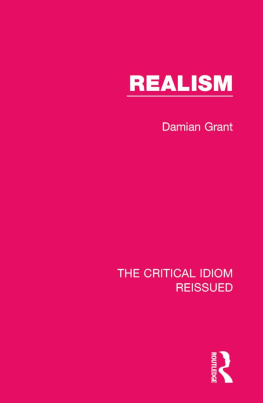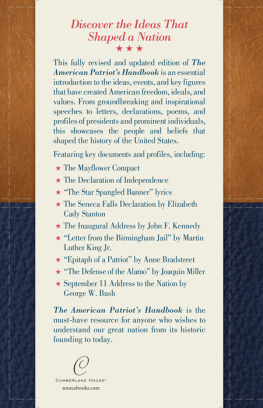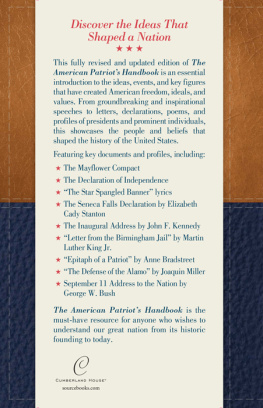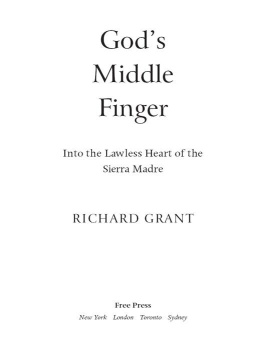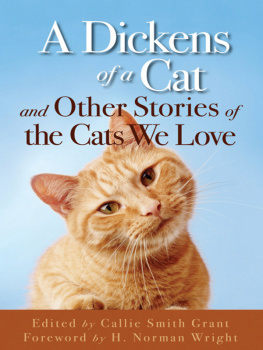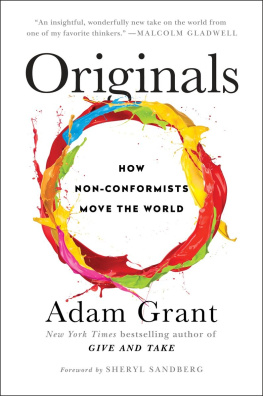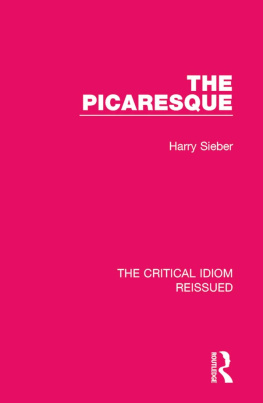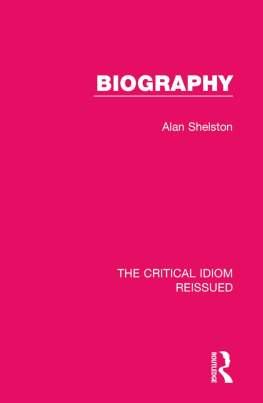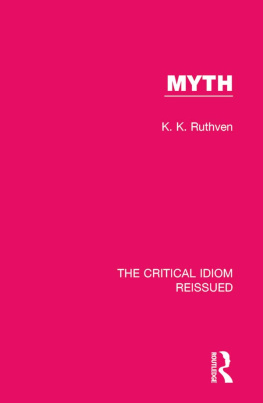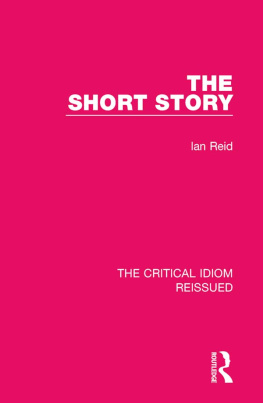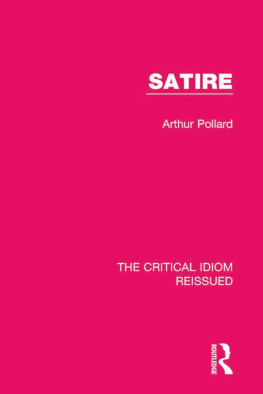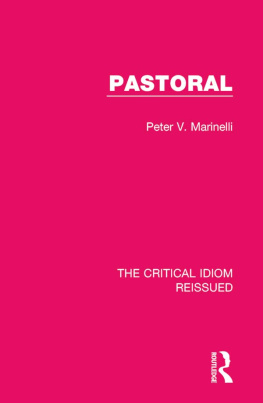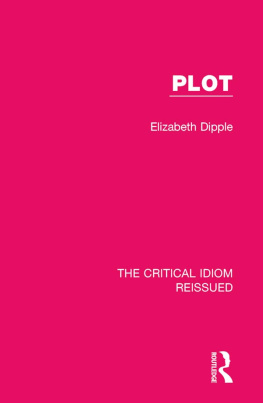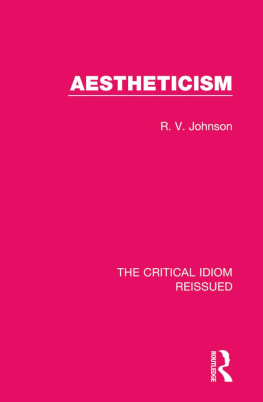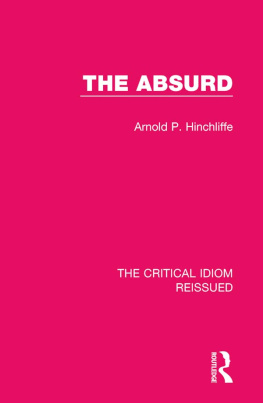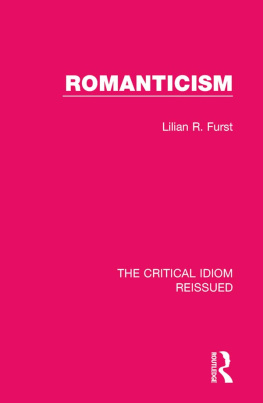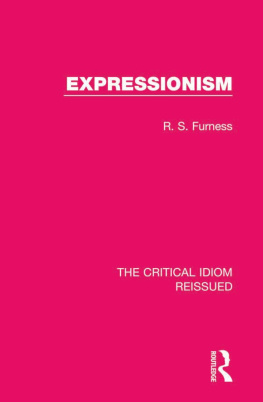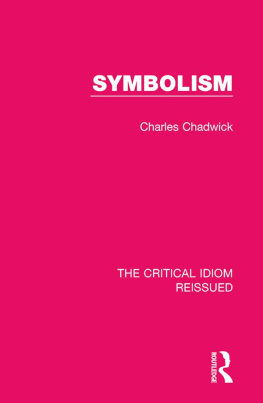Table of Contents
Guide
Print Page Numbers
THE CRITICAL IDIOM REISSUED
Volume 8
REALISM
REALISM
DAMIAN GRANT
First published in 1970 by Methuen & Co Ltd
This edition first published in 2018
by Routledge
2 Park Square, Milton Park, Abingdon, Oxon OX14 4RN
and by Routledge
711 Third Avenue, New York, NY 10017
Routledge is an imprint of the Taylor & Francis Group, an informa business
1970 Damian Grant
All rights reserved. No part of this book may be reprinted or reproduced or utilised in any form or by any electronic, mechanical, or other means, now known or hereafter invented, including photocopying and recording, or in any information storage or retrieval system, without permission in writing from the publishers.
Trademark notice: Product or corporate names may be trademarks or registered trademarks, and are used only for identification and explanation without intent to infringe.
British Library Cataloguing in Publication Data
A catalogue record for this book is available from the British Library
ISBN: 978-1-138-21971-7 (Set)
ISBN: 978-1-315-26975-7 (Set) (ebk)
ISBN: 978-1-138-28319-0 (Volume 8) (hbk)
ISBN: 978-1-315-11557-3 (Volume 8) (ebk)
Publishers Note
The publisher has gone to great lengths to ensure the quality of this reprint but points out that some imperfections in the original copies may be apparent.
Disclaimer
The publisher has made every effort to trace copyright holders and would welcome correspondence from those they have been unable to trace.
Realism
Damian Grant
First published 1970
by Methuen & Co Ltd
11 New Fetter Lane London EC4
1970 Damian Grant
SBN 416 17810 3 Hardback
SBN 416 17820 o Paperback
This title is available in both hardback and paperback editions. The paperback edition is sold suhject to the condition that it shall not, hy way of trade or otherwise, be lent, re-sold, hired out, or otherwise circulated without the publishers prior consent in any form of binding or cover other than that in which it is published and without a similar condition including this condition heing imposed on the suhsequent purchaser.
Distributed in the U.S.A.
by Barnes & Noble Inc.
For TERESA: sine qua non
Contents
This volume is one of a series of short studies, each dealing with a single key item, or a group of two or three key items, in our critical vocabulary. The purpose of the series differs from that served by the standard glossaries of literary terms. Many terms are adequately defined for the needs of students by the brief entries in these glossaries, and such terms will not be the subjects of studies in the present series. But there are other terms which cannot be made familiar by means of compact definitions. Students need to grow accustomed to them through simple and straightforward but reasonably full discussions of them. The purpose of this series is to provide such discussions.
Some of the terms in question refer to literary movements (e. g., Romanticism, Aestheticism, etc.), others to literary kinds (e. g., Comedy, Epic, etc.), and still others to stylistic features (e. g., Irony, The Conceit, etc.). Because of this diversity of subject-matter, no attempt has been made to impose a uniform pattern upon the studies. But all authors have tried to provide as full illustrative quotation as possible, to make reference whenever appropriate to more than one literature, and to compose their studies in such a way as to guide readers towards the short bibliographies in which they have made suggestions for further reading.
John D. Jump
University of Manchester
I should like to thank Professor Jump for the interest he has taken in this study, and his attentive criticism made early and late in the composition; also Dr Lilian Furst, for her conversation on the subject and the loan of some useful books; and especially the willing help given by my wife Teresa, who restrained my translations whilst typing the text (as she alone is able to) from my unmannerly handwriting.
In order to avoid redundancy, I have not in every instance given both the original and a translation of material quoted from the French. Where it seemed easily understandable I have sometimes left only the French; often I have simply given an English translation, with a reference to the French source.
For ease of reference to a small number of books (full details of which may be found in the bibliography) I have used the following abbreviations:
| AN | Henry James The Art of the Novel |
| DMLR | George J. Becker Documents of Modern Literary Realism |
| ECN | Kenneth Graham English Criticism of the Novel 18651900 |
| GH | Harry Levin The Gates of Horn |
| OP | Wallace Stevens Opus Posthumous |
| RE | mile Zola Le Roman Exprimental |
| RN | J. H. Bornecque et P. Cogny Ralisme et Naturalisme |
| RNS | Roland S. Stromberg Realism, Naturalism, Symbolism |
I
If, as Henry James claimed, the Novel remains still, under the right persuasion, the most independent, most elastic, most prodigious of literary forms (AN, p. 326) then the word realism so often invoked in the discussion of it must surely be the most independent, most elastic, most prodigious of critical terms. But whereas the qualities James celebrates extend the possibilities of a literary form, they are more likely to restrict the possibilities of a critical term; and certainly the word realism, with its apparent independence of any formal, contentual, or qualitative description, and its unmanageable elasticity, is a prodigy that most people feel they could do well without.
Nothing illustrates the chronic instability of the word more clearly than its uncontrollable tendency to attract another qualifying word, or words, to provide some kind of semantic support. The curious reader will not have to adventure far into critical literature before coming upon some of the following, which I have arranged in alphabetical order since they could not be persuaded to obey any other: critical realism, durational realism, dynamic realism, external realism, fantastic realism, formal realism, ideal realism, infra-realism, ironic realism, militant realism, nave realism, national realism, naturalist realism, objective realism, optimistic realism, pessimistic realism, plastic realism, poetic realism, psychological realism, quotidian realism, romantic realism, satiric realism, socialist realism, subjective realism, super-subjective realism, visionary realism. Many of these will be found scattered in George J. Beckers collection of documents on realism; others are from modem criticism. Wimsatt and Brooks create a scale of low realism, high realism, and drab realism in their

